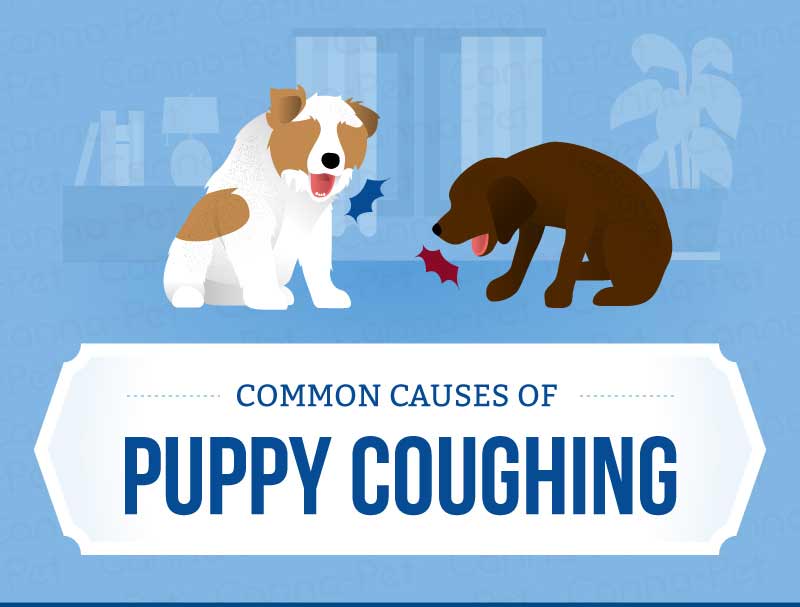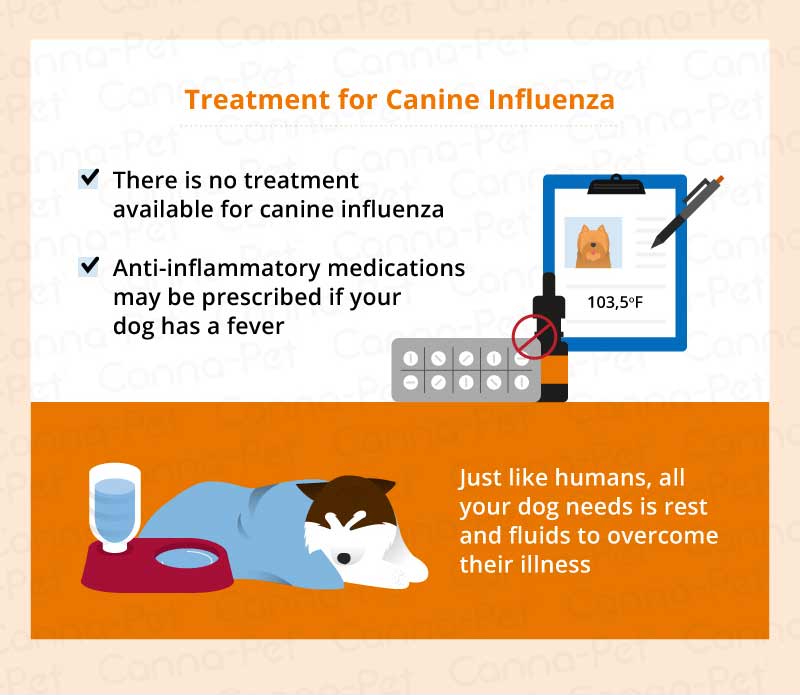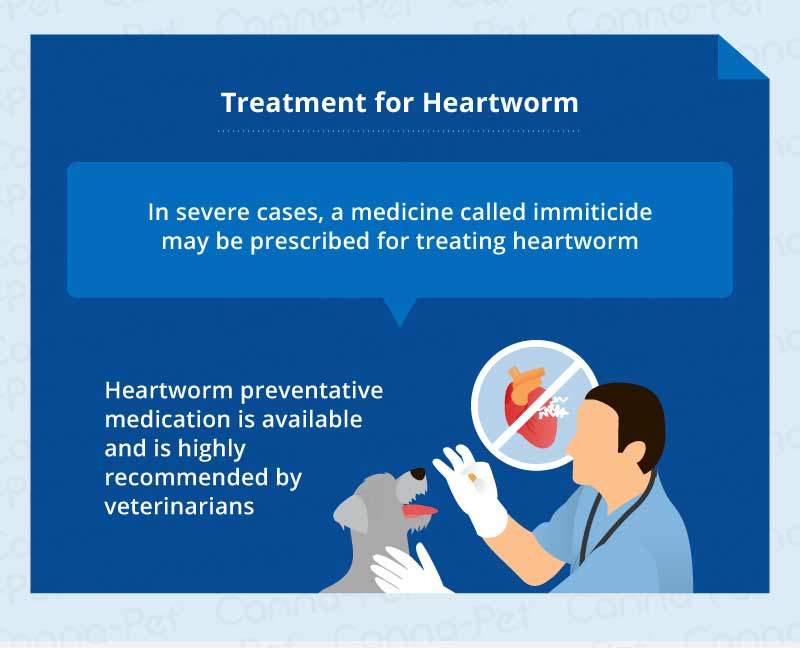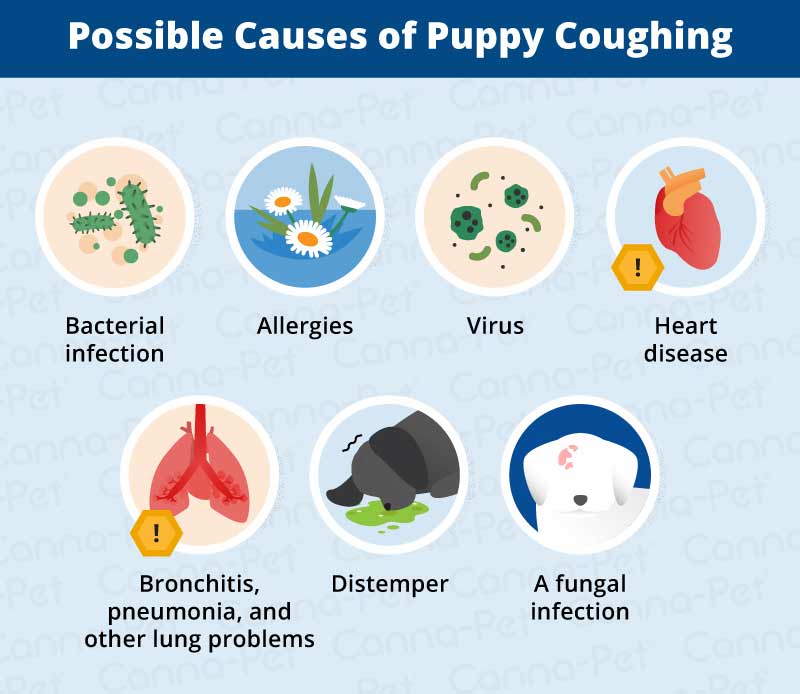While it might seem strange, dogs cough a lot. It’s normal for them, especially considering they live so much of their lives through their noses. It’s thankfully not a cause for alarm and about on par with a human sneezing or clearing their throat. Coughing is a means of removing dust, germs, pollen, or other debris that your dog might have breathed in.
However, if your pup is coughing frequently or seems unable to stop, you may need to take him to the vet immediately. A persistent cough may point to a serious underlying issue that may be potentially life threatening. Let’s take a look at some of the most common causes of puppy coughing and what you can do to help.
Causes of Puppy Coughing
While some coughing is normal, you should take your puppy to the vet if the cough lasts for longer than a week or gets worse. You should also make an appointment if the coughing seems to be accompanied by:
- A fever
- Sudden lack of appetite
- Fatigue or general tiredness
- Other noticeable health issues
Your puppy’s vet will perform a physical examination and run some tests to figure out what is specifically causing the issue—a virus, a bacterial infection, allergies, or something else entirely.
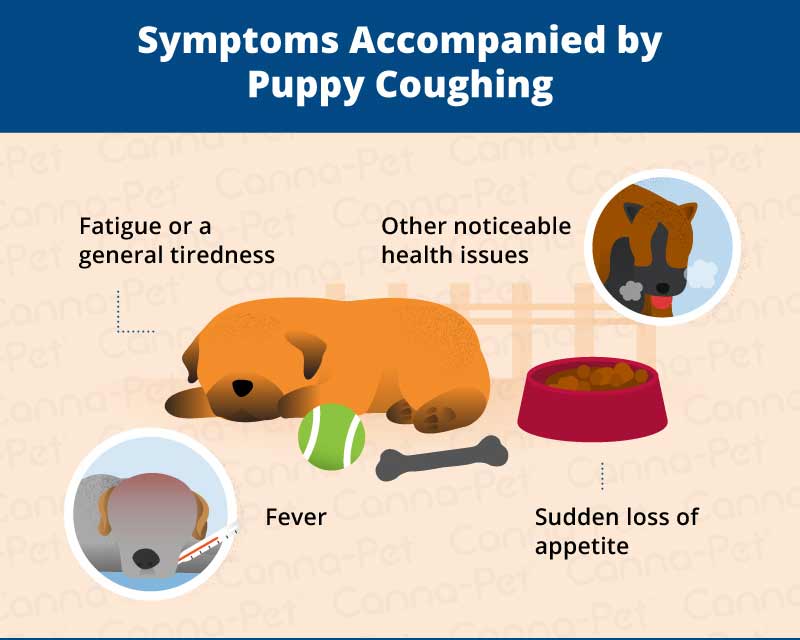
Kennel Cough
Kennel cough, alternately known as bordetellosis or canine infectious tracheobronchitis, is one of the most common causes for excessive coughing. Kennel cough is considered a highly contagious respiratory disease that causes inflammation in a dog’s trachea, larynx, and bronchi. Most dogs will contract kennel cough at least once in their lives.
Kennel cough can be caused by various bacteria or viruses, though the most common is called Bordetella bronchiseptica, entering your puppy’s respiratory tract. As the disease is so contagious, it’s most often contracted in areas with a lot of dog traffic, such as dog shows, dog parks, daycare and boarding facilities, kennels, and training classes. The bacteria and viruses that cause kennel cough can easily be spread via direct contact, water droplets, or contaminated surfaces, like shared water bowls.
The most obvious symptom of kennel cough is a strong, persistent cough that has a distinct honking sound, almost like your dog is choking. This can be accompanied by:
- Sneezing
- A runny nose
- Eye discharge
- Low fever
Most cases of kennel cough are mild, so your puppy should still have a good appetite and maintain high energy, but more severe cases can be met with fatigue, lethargy, pneumonia, and possible death.
Dogs who are at high risk of kennel cough also tend to have weak or compromised immune systems to begin with. This is why puppies are prone to suffering the most severe complications, though older dogs, pregnant dogs, and dogs with preexisting respiratory diseases may also have a higher risk of kennel cough.
Some factors that may weaken your dog’s natural respiratory defenses include:
- Colder temperatures
- Stress caused by travel
- Exposure to cigarette smoke and dust
- Crowded rooms or rooms with poor ventilation, like kennels and shelters
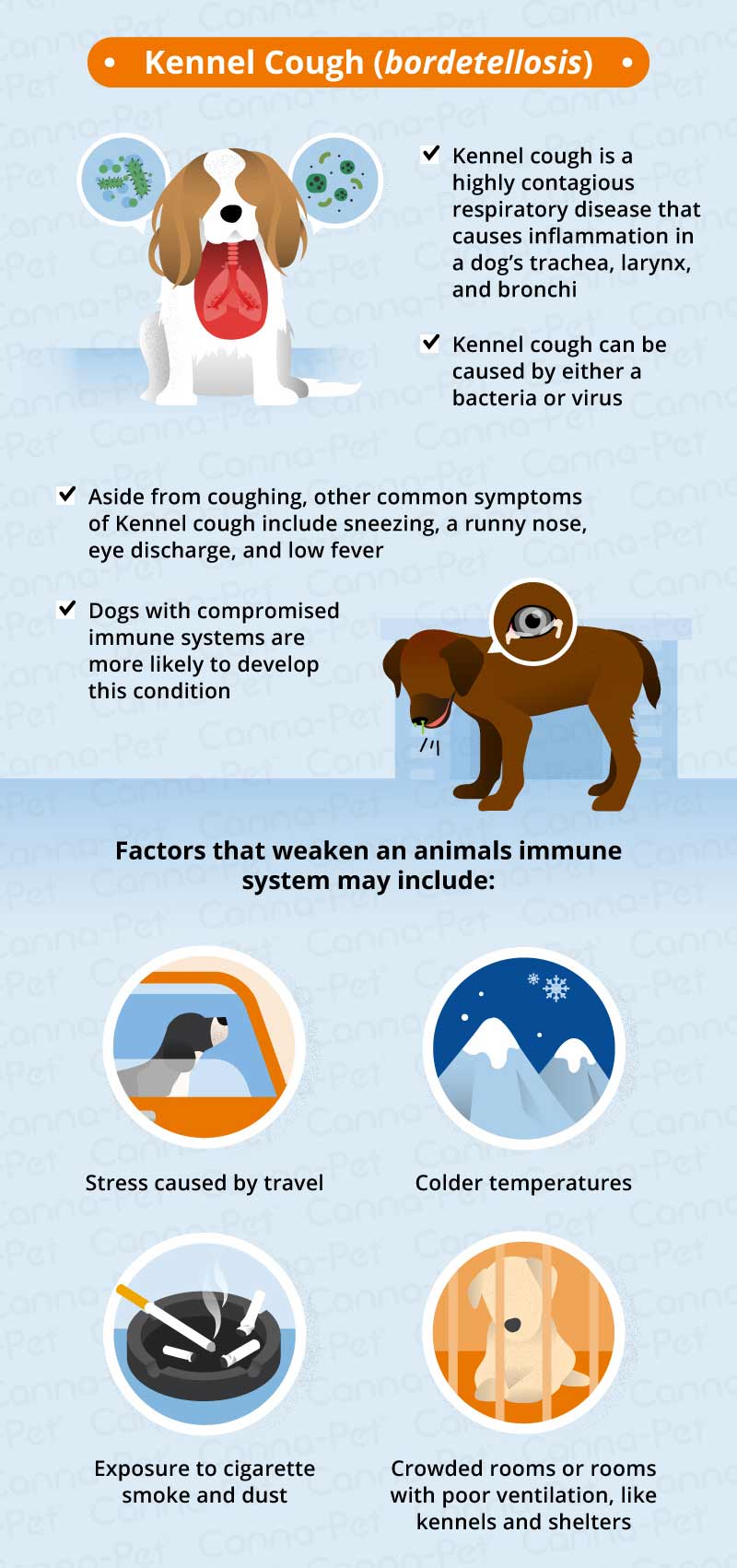
As bad as kennel cough sounds, it’s thankfully easy and simple to treat. Most cases of kennel cough will resolve on their own without need for medical treatment, but medication can help to speed up recovery and make your pup more comfortable. Your vet can prescribe antibiotics to target the bacteria and prevent secondary infections or cough medicines to ease your pup’s hacking.
As the owner, you should consider using a harness instead of a collar to walk your dog as the collar may cause more irritation to the trachea, which can aggravate the kennel cough. You should also consider keeping your dog in an area with good humidity and isolating your pup from other dogs until he fully recovers.
There are vaccines available that may potentially help to prevent kennel cough in your dog, but they don’t always guarantee protection. Much like the human flu or cold, kennel cough can be caused by so many different types of bacteria and viruses that are constantly evolving. The best thing you can do to prevent kennel cough is to stay observant of your dog’s health and symptoms.
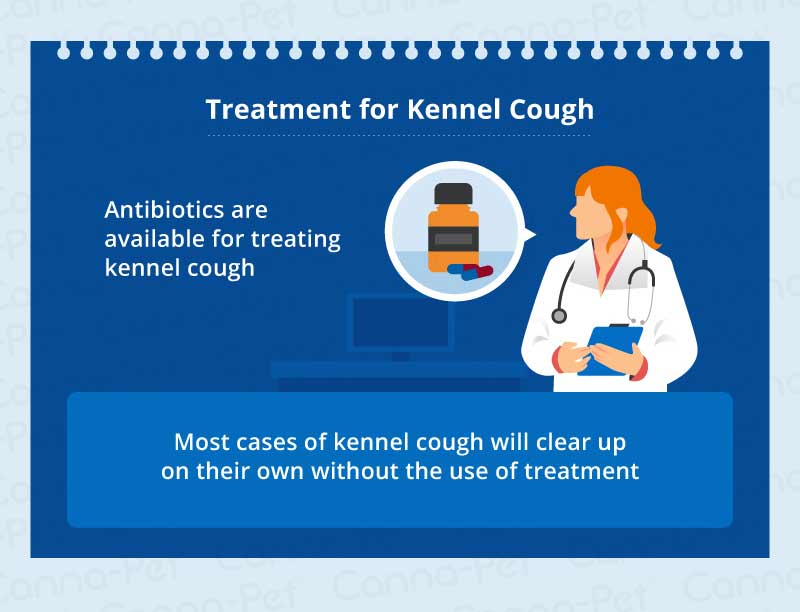
Canine Influenza
First identified in Florida in 2004, Influenza Type A (H3N8) is the most common virus responsible for causing canine influenza. H3N8 originated in horses before mutating and affecting greyhounds. Another virus known as H3N2 came from Asia and caused a canine flu outbreak in 2015 and 2016.
Dog flu is spread mainly through the air. Coughing, barking, and sneezing causes the bacteria to spread through airborne water droplets that can easily be inhaled by other passing canines. The virus can also spread through contaminated objects, like shared food bowls, collars, or kennel cages. You may even spread it to your dog yourself if you have been in contact with a sick pup.
The canine influenza viruses affects your dog’s respiratory system and is highly contagious. The general symptoms of the dog flu include:
- Coughing
- Sneezing
- Fever
- Malaise
- Loss of appetite
- Runny nose
- Red eyes
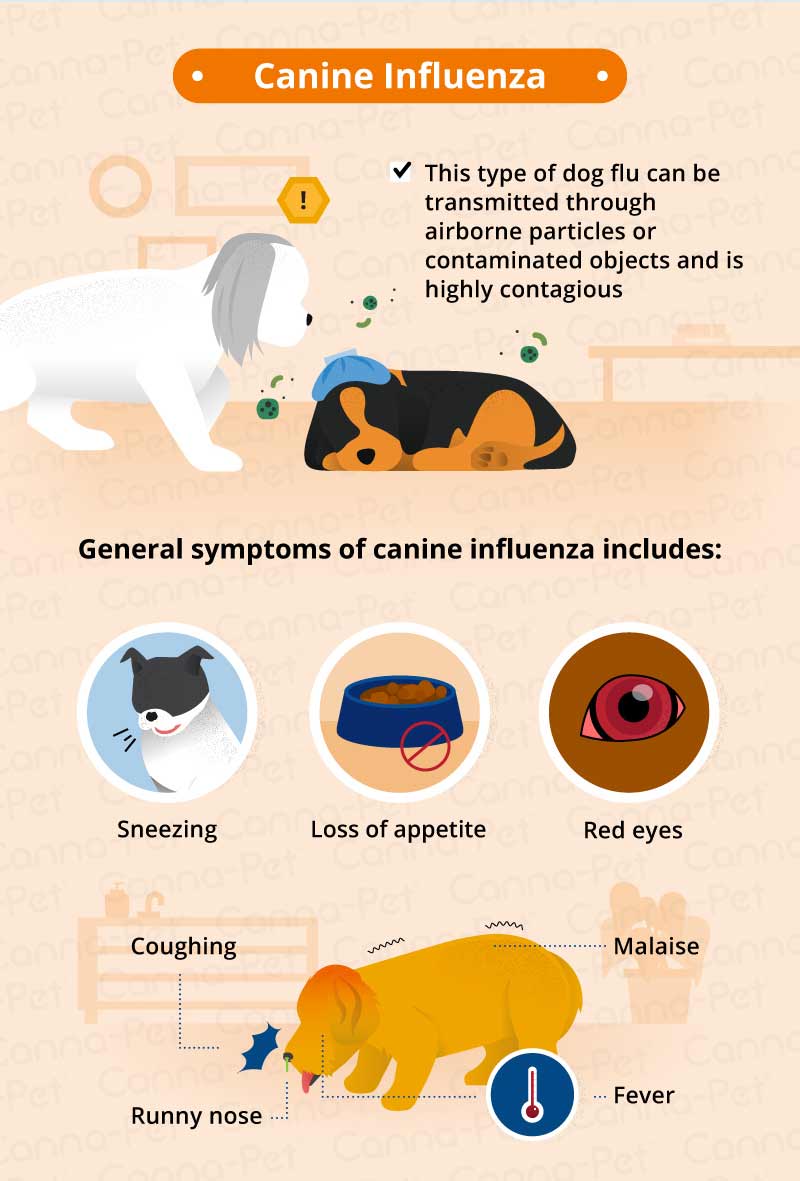
That said, about a 25 percent of dogs infected with canine influenza will show no symptoms, but they can still spread the disease.
In mild cases, puppies will have a cough that may be moist or dry and nasal discharge. This lasts for 10 days to a full month. Severe cases of dog flu involve the same coughing and sneezing accompanied with a high fever (usually over 104 degrees Fahrenheit). This can potentially develop to hemorrhagic pneumonia, which may lead to the puppy coughing up blood or having trouble breathing. Severe dog flu may also lead to bacterial pneumonia, causing even more complications.
Dogs of all ages, sizes, and demeanors are susceptible to the dog flu, but dogs with pushed in faces, like Pekingese, French Bulldogs, and Pugs, may have a harder time dealing with the flu as they are already prone to breathing and respiratory issues.
There isn’t a cure for the canine flu. Most treatments involve maintaining your puppy’s comfort while managing any symptoms. Nonsteroidal anti-inflammatory medications can help to bring down your pup’s fever, but most cases of canine influenza will go away on their own with plenty of rest and fluids. Ask your vet about proper quarantine procedures to prevent the spread of canine influenza to other dogs.
Heartworm
Heartworms are a parasitic nematode scientifically known as Dirofilaria immitis. Heartworm is most common in tropical and subtropical climates as well as along the Gulf Coast and Atlantic.
The only way dogs can get heartworm is from the bite of a mosquito infected by the parasite larva. Once the dog has been bitten by an infected mosquito, it takes about seven months for the larva to grow into an adult heartworm.
Adult heartworms lodge in a dog’s heart, lungs, and blood vessels, reproducing and spreading. Adults can grow up to a foot long and live up to seven years. A dog can have upwards of 250 of these heartworms in its system.
Symptoms for heartworm disease differ based on the three classes of the disease.
- Class I – Most dogs with class I of this disease show no symptoms or minimal symptoms, like an occasional cough.
- Class II – These dogs will cough more frequently and be uncharacteristically intolerant to exercise or physical activity.
- Class III – In the most severe cases of heartworm, dogs may have fainting spells, show intolerance to exercise, exhibit signs of anemia, and have right-sided chronic heart failure.
Physical examination may reveal other symptoms, like high blood pressure, rapid heartbeat, and labored breathing.
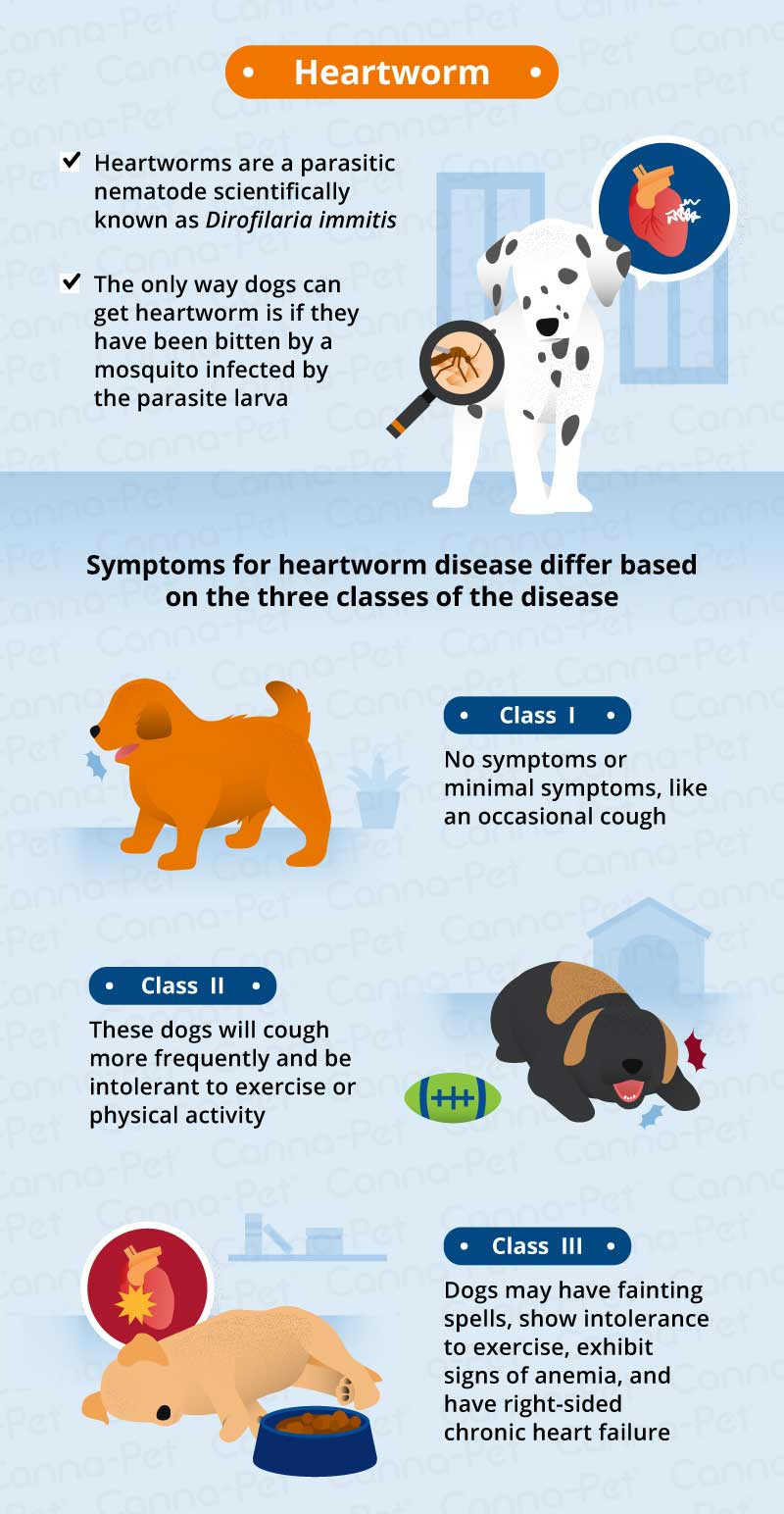
The prognosis is good for dogs with mild to moderate cases of heartworm disease, but in severe cases, dogs may suffer from lung complications because of the more aggressive medication needed to treat the infection.
The drug for treating heartworm disease is called Immiticide. It is an arsenic-based medication that is administered in two to three injections. The medication successfully kills the heartworms in and around the blood vessels in your dog’s heart. As effective as this medication is, it shouldn’t be considered lightly.
It requires an extensive pre-treatment workup, which includes blood work, x-rays, and a variety of tests to determine the severity of the infection and the amount of medication necessary to eliminate the heartworms without harming your dog.
Any larva remaining after the administration of Immiticide can be killed using a monthly prophylaxis that you can give to your dog at home. In severe cases, your dog may require surgery to remove heartworms from the pulmonary artery and right heart through your dog’s jugular vein. However, this surgery is generally only reserved in serious infections where the dog has a high number of mature heartworms in his system.
Thankfully, heartworm medication can easily and effectively prevent heartworm infections from ever happening. Heartworm medications come in a variety of forms, from monthly pills to topical creams to injected medications administered every six months, and it is all highly affordable.
Depending on your dog’s size, you only need to pay $35 to $80 a year for preventative heartworm treatments. You should also invest in these treatments even after your dog has been infected as he can get heartworms again.
Other Causes of Puppy Coughing
Along with these common causes of coughing, your puppy may be suffering from:
- A fungal infection
- Distemper
- Heart disease
- Bronchitis, pneumonia, and other lung problems
These are less common and can generally be prevented or treated with medication, surgery, and special diets.
Preventing Puppy Coughs
The best thing you can do to prevent coughing and more serious diseases in your pup is to make sure he visits the vet regularly and gets his vaccinations and heartworm medication every year. Make sure your dog drinks plenty of water and eats a healthy, balanced diet filled with nutrients.
Keep your dog away from other dogs that are coughing or show signs of sickness. If your dog seems out of sorts, take him to the vet immediately. After getting any diagnosis, give your dog plenty of rest and love.
Sources:
- “When Your Dog Can’t Stop Coughing.” WebMD, Accessed 6 May 2017. www.pets.webmd.com/dogs/coughing-dogs-causes#1.
- “Why Is My Puppy Coughing?” Small Dog Place, Accessed 6 May 2018. www.smalldogplace.com/puppy-coughing.html.
- “Puppy Coughing | Causes and Treatment for a Coughing Puppy.” DogzHealth , 21 June 2018, Accessed 6 May 2018. www.dogzhealth.com/puppy-coughing/.
- “How Serious Is Puppy Coughing? Five Possible Causes.” VetInfo, Accessed 6 May 2017. www.vetinfo.com/puppy-coughing-symptoms.html.
- “9 Things To Do If Your Puppy Has Kennel Cough.” Whole Dog Journal, 11 Apr. 2017, Accessed 6 May 2017. www.whole-dog-journal.com/news/If-Your-Dog-Has-Kennel-Cough-21633-1.html.


